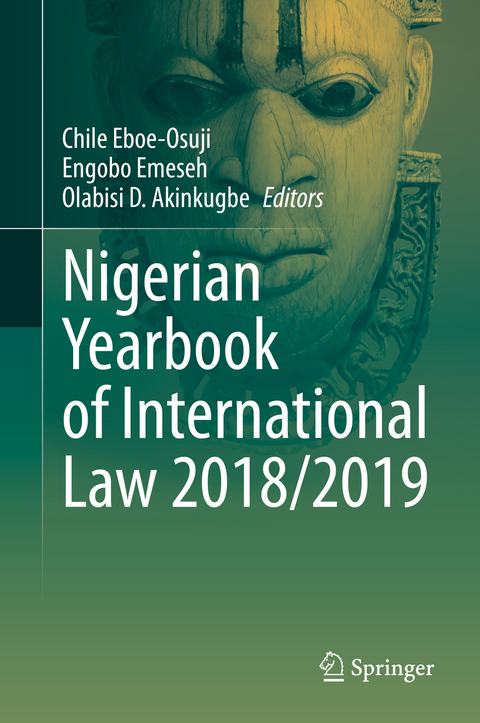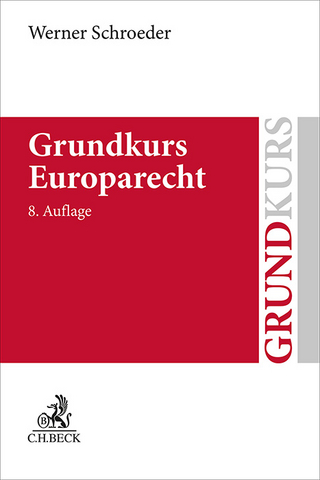
Nigerian Yearbook of International Law 2018/2019
Springer International Publishing (Verlag)
978-3-030-69593-4 (ISBN)
The contributions to this volume focus on a diverse array of topics in international law, with scholarly interventions from experts in the field, both in academia and the judiciary, as well as case commentary on a recent decision of the International Court of Justice (Chagos Decision). The theoretical and methodological breadth of the issues covered are relevant to audiences beyond the Nigerian and African intellectual space. In particular, this volume includes analysis on critical intellectual property law questions; intersections of national, regional and international law and technology; the African Continental Free Trade Area Agreement; and maritime law. The authoritative views of the experts on the different issues covered in this volume make excellent contributions to their relevant fields.
lt;p>
Chile Eboe-Osuji, LLB, LLM, LLD, is the President of the International Criminal Court since 11 March 2018. Prior to joining the ICC, Judge Eboe-Osuji was the Legal Advisor to the UN High Commissioner for Human Rights, during which time he anchored the High Commissioner's interventions in cases involving human rights questions. In that capacity, he led the writing of amicus curiae submissions to the European Court of Human Rights and the United States Supreme Court. He served as principal appeals counsel for the Prosecution in the Charles Taylor Case at the Special Court for Sierra Leone, and has held several posts at the International Criminal Tribunal for Rwanda, including Head of Chambers and Lead Prosecution Trial Counsel.
He practiced law as a barrister before trial courts in Nigeria and Canada; and conducted appeals before the Court of Appeal for Ontario (Canada) and the Supreme Court of Canada.
Judge Eboe-Osuji taught international criminal law as adjunct professor at the Faculty of Law of the University of Ottawa. He served as legal expert to Nigeria's delegation to the ICC-ASP Special Working Group on the Definition of the Crime of Aggression.
He was called to the Bar in Nigeria (1986); Ontario, Canada (1992); and British Columbia, Canada (1982).
Judge Eboe-Osuji received his PhD degree from the University of Amsterdam, the Netherlands (with thesis in international criminal law). He received his LLM degree from McGill University, Canada; and also did his Canadian law accreditation studies at McGill. He received the LLB degree from the University of Calabar, Nigeria.Olabisi D. Akinkugbe, PhD is an Assistant Professor at the Schulich School of Law. He joined the Schulich School of Law faculty in 2017 and holds a Ph.D. from the University of Ottawa, an LL.M. from the University of Toronto, and an LL.B. from the University of Lagos, Nigeria. Before joining the Schulich School of Law, Professor Akinkugbe was an Assistant Professor at the Faculty of Law, University of New Brunswick. Prof. Akinkugbe is a founding editor of Afronomicslaw - a blog on all aspects of international economic law as they relate to Africa and the Global South.
Engobo Emeseh, LLB, LLM, MSc, PhD is Head of Law School, University of Bradford. She has extensive experience in higher education both within and outside the UK. Professor Emeseh has led the development of innovative market relevant degree schemes, portfolio reviews, and diversification of delivery formats to cater to a wide audience, maximise resources, and improve the student learning experience, including external engagement and skills development. Engobo obtained her PhD from the Centre for Energy Petroleum and Mineral Law and Policy, University of Dundee. She graduated with a first class from the Nigeria Law School and Distinction from the University of Wales Cardiff. She is a former British Council Chevening Scholar, and a Ford Foundation (IFP) doctoral fellow. Prior to her academic career, she practiced as a barrister and solicitor in Nigeria, having been called to the Nigerian Bar.
Part I - International Law: New Reflections on Humankind as a Subject of International Law by Judge Antônio Augusto Cançado Trindade.- Can the Law Respond to Threatened Apocalypse? by Judge David Baragwanath.- The Rule of International Law - Where Are We Going? by Judge Howard Morrison.- Part II - Environmental Law and Natural Resources Law: Coastal State Regulation of the Use of Arms in the Private Protection of Commercial Vessels in the Gulf of Guinea: A Nigerian Perspective by Osatohanmwen O. Anastasia Eruaga.- Joint Development of Transboundary Natural Resources - Lessons from the Nigeria-São Tomé e Príncipe Joint Development Zone by Adaeze Okoye, Mariam Masini, and Alache Fisho.- Implementing Extended Producer Responsibility (EPR)-based Electronic Waste Institutions in Nigeria: Lessons from the Global North by Irekpitan Okukpon.- Part III - Intellectual Property: The Participation of Pharmaceutical Drug Industry in Patent Governance and Law-Making: A Case Study of India and Nigeria by Amaka Vanni.- Part IV - International Criminal Law: The International Criminal Court - What Has It Accomplished? by Judge Chile Eboe-Osuji.- Improving the Efficiency of International Criminal Courts and Tribunals: The Paris Declaration on the Effectiveness of International Criminal Justice by Judge Ivana Hrdlicková, Adrian Plevin and Amanda Fang.- The International Criminal Court on the Rohingyas' Situation and the Early Scholarly Echo of the Decision by Judge Péter Kovacs.- The Law's Response to the Plight of Victims of Trauma in the Context of International Criminal Justice by Judge Daniel D. Ntanda Nsereko.- Part V - International Human Rights and Humanitarian Law: TWAILing the Minimum Core Concept: Re-thinking the Minimum Core of Economic and Social Rights in the Third World by CarolineOmari Lichuma.- Health and Development in Africa: How Far Can the Human Rights Jurisprudence Go? by Olasupo Owoeye.- Determining the Termination of a Non-International Armed Conflict: An Analysis of the Boko Haram Insurgency in Northern Nigeria by Solomon Ukhuegbe and Alero I. Fenemigho.- Part VI - International Economic Law/International Investment Law: African Investment Agreement Reform and its Contribution to Sustainable Foreign Investment by Gudrun Monika Zagel.- The African Continental Free Trade Area (AfCFTA) and the Imperative of Democratic Legitimacy: An Analysis by Babatunde Fagbayibo.- Part VII - Contemporary Challenges/Emerging Issues: Technology and the Law: The impact of Artificial Intelligence (AI) on Litigation and Dispute Resolution in Africa by Izuoma Egeruoh-Adindu.- Child Rights Protection, Nigerian Federalism and Culture: Irreconcilable Goals? by Fife Lekan Ogunde.- Part VIII - Case Comment: Decolonising the Chagos Islands? by John Reynolds.
| Erscheinungsdatum | 09.08.2021 |
|---|---|
| Reihe/Serie | Nigerian Yearbook of International Law |
| Zusatzinfo | IX, 465 p. 4 illus., 2 illus. in color. |
| Verlagsort | Cham |
| Sprache | englisch |
| Maße | 155 x 235 mm |
| Gewicht | 830 g |
| Themenwelt | Recht / Steuern ► EU / Internationales Recht |
| Schlagworte | AfCFTA • African Continental Free Trade Area agreement • African Investment Agreement Reform • armed conflict • Boko Haram • Chagos case • Humanitarian Law • Human Rights • ICJ • Intellectual Property Law • International Court of Justice • IP Law • Law and Technology |
| ISBN-10 | 3-030-69593-X / 303069593X |
| ISBN-13 | 978-3-030-69593-4 / 9783030695934 |
| Zustand | Neuware |
| Haben Sie eine Frage zum Produkt? |
aus dem Bereich


